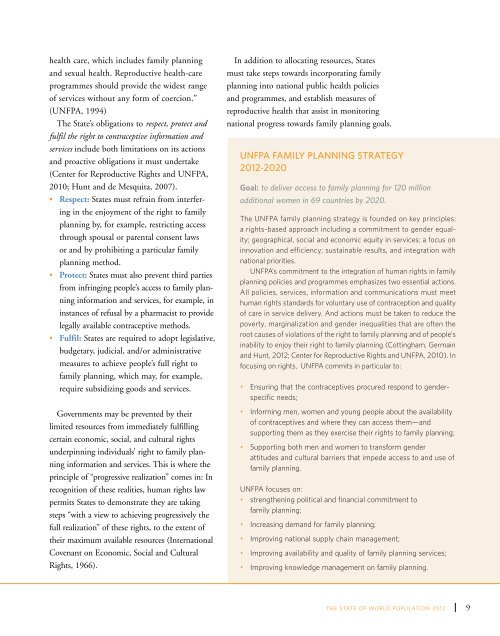State of World Population 2012 - Country Page List - UNFPA
State of World Population 2012 - Country Page List - UNFPA
State of World Population 2012 - Country Page List - UNFPA
You also want an ePaper? Increase the reach of your titles
YUMPU automatically turns print PDFs into web optimized ePapers that Google loves.
health care, which includes family planning<br />
and sexual health. Reproductive health-care<br />
programmes should provide the widest range<br />
<strong>of</strong> services without any form <strong>of</strong> coercion.”<br />
(<strong>UNFPA</strong>, 1994)<br />
The <strong>State</strong>’s obligations to respect, protect and<br />
fulfil the right to contraceptive information and<br />
services include both limitations on its actions<br />
and proactive obligations it must undertake<br />
(Center for Reproductive Rights and <strong>UNFPA</strong>,<br />
2010; Hunt and de Mesquita, 2007).<br />
• Respect: <strong>State</strong>s must refrain from interfering<br />
in the enjoyment <strong>of</strong> the right to family<br />
planning by, for example, restricting access<br />
through spousal or parental consent laws<br />
or and by prohibiting a particular family<br />
planning method.<br />
• Protect: <strong>State</strong>s must also prevent third parties<br />
from infringing people’s access to family planning<br />
information and services, for example, in<br />
instances <strong>of</strong> refusal by a pharmacist to provide<br />
legally available contraceptive methods.<br />
• Fulfil: <strong>State</strong>s are required to adopt legislative,<br />
budgetary, judicial, and/or administrative<br />
measures to achieve people’s full right to<br />
family planning, which may, for example,<br />
require subsidizing goods and services.<br />
Governments may be prevented by their<br />
limited resources from immediately fulfilling<br />
certain economic, social, and cultural rights<br />
underpinning individuals’ right to family planning<br />
information and services. This is where the<br />
principle <strong>of</strong> “progressive realization” comes in: In<br />
recognition <strong>of</strong> these realities, human rights law<br />
permits <strong>State</strong>s to demonstrate they are taking<br />
steps “with a view to achieving progressively the<br />
full realization” <strong>of</strong> these rights, to the extent <strong>of</strong><br />
their maximum available resources (International<br />
Covenant on Economic, Social and Cultural<br />
Rights, 1966).<br />
In addition to allocating resources, <strong>State</strong>s<br />
must take steps towards incorporating family<br />
planning into national public health policies<br />
and programmes, and establish measures <strong>of</strong><br />
reproductive health that assist in monitoring<br />
national progress towards family planning goals.<br />
<strong>UNFPA</strong> FAMILY PLANNING STRATEGY<br />
<strong>2012</strong>-2020<br />
Goal: to deliver access to family planning for 120 million<br />
additional women in 69 countries by 2020.<br />
The <strong>UNFPA</strong> family planning strategy is founded on key principles:<br />
a rights-based approach including a commitment to gender equality;<br />
geographical, social and economic equity in services; a focus on<br />
innovation and efficiency; sustainable results, and integration with<br />
national priorities.<br />
<strong>UNFPA</strong>’s commitment to the integration <strong>of</strong> human rights in family<br />
planning policies and programmes emphasizes two essential actions.<br />
All policies, services, information and communications must meet<br />
human rights standards for voluntary use <strong>of</strong> contraception and quality<br />
<strong>of</strong> care in service delivery. And actions must be taken to reduce the<br />
poverty, marginalization and gender inequalities that are <strong>of</strong>ten the<br />
root causes <strong>of</strong> violations <strong>of</strong> the right to family planning and <strong>of</strong> people’s<br />
inability to enjoy their right to family planning (Cottingham, Germain<br />
and Hunt, <strong>2012</strong>; Center for Reproductive Rights and <strong>UNFPA</strong>, 2010). In<br />
focusing on rights, <strong>UNFPA</strong> commits in particular to:<br />
• Ensuring that the contraceptives procured respond to genderspecific<br />
needs;<br />
• Informing men, women and young people about the availability<br />
<strong>of</strong> contraceptives and where they can access them—and<br />
supporting them as they exercise their rights to family planning;<br />
• Supporting both men and women to transform gender<br />
attitudes and cultural barriers that impede access to and use <strong>of</strong><br />
family planning.<br />
<strong>UNFPA</strong> focuses on:<br />
• strengthening political and financial commitment to<br />
family planning;<br />
• Increasing demand for family planning;<br />
• Improving national supply chain management;<br />
• Improving availability and quality <strong>of</strong> family planning services;<br />
• Improving knowledge management on family planning.<br />
THE STATE OF WORLD POPULATION <strong>2012</strong><br />
9
















